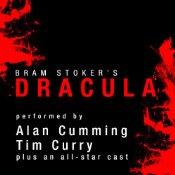I recently listened to one of my all-time favorite books again in honor of Halloween. I’ve read it or listened to it so many times, I could practically recite certain passages, but it never gets old. I still laugh at the dramatics, groan over poor Lucy, and get delicious thrills whenever someone directly interacts with the Count.
Happy Halloween!!
Title: Dracula
Author: Bram Stoker
Narrators: Alan Cumming, Tim Curry, Simon Vance, Katherine Kellgren, Susan Duerden, John Lee, Graeme Malcolm, Steven Crossley, James Adams
ISBN: B007B7GOYQ
Audiobook Length: 15 hours, 28 minutes
Genre: Horror, Classics
Origins: Mine. All mine.
Release Date: 26 May 1897
Bottom Line: I never get tired of reading this story. Sure, it’s melodramatic and excessive in its purity versus evil theme, but Dracula is the greatest villain to never speak a direct line in a story.
”Because of the widespread awareness of the story of the evil Transylvanian count and the success of numerous film adaptations that have been created over the years, the modern audience hasn’t had a chance to truly appreciate the unknowing dread that readers would have felt when reading Bram Stoker’s original 1897 manuscript. Most modern productions employ campiness or sound effects to try to bring back that gothic tension, but we’ve tried something different. By returning to Stoker’s original storytelling structure – a series of letters and journal entries voiced by Jonathan Harker, Dr. Van Helsing, and other characters – with an all-star cast of narrators, we’ve sought to recapture its originally intended horror and power.
This production of Dracula is presented by what is possibly the best assemblage of narrating talent ever for one audiobook. These stellar narrators have been cast as follows:
- Dr. Seward: Alan Cumming
- Jonathan Harker: Simon Vance
- Mina Murray/Harker: Katy Kellgren
- Lucy Westenra: Susan Duerden
- Van Helsing: Tim Curry
- Graeme Malcolm: Dailygraph correspondent
- Steven Crossley: Zookeeper’s account and reporter
- Simon Prebble: Varna
- James Adams: Patrick Hennessey
- Nicola Barber: Sister Agatha
- Victor Villar-Hauser: Arthur Holmwood
- Marc Vietor: Quincey Morris
- John Lee: Introductory paragraph, various letters”
Thoughts: Long-time readers knows that I have an unabashed love affair with vampires and that Dracula, read for the first time in fourth grade, was the origins of this great love of mine. There is something so utterly horrifying about this mysterious Count Dracula, who never speaks of his own accord and whom the reader only gets to know through the words of others, that continues to appeal to modern audiences. The chance to appreciate this beloved novel through an auditory experience, as narrated by some of the best narrators out there today, was an experience that I was definitely not going to miss.
The audiobook experience was exactly what I was hoping it would be and even more. The problem with such a familiar story is that it is all too easy to gloss over the specifics and skim scenes that appear to drag. Audiobooks are not easily conducive to such reading habits, thankfully, and as a result, this is probably the first time in a very long time I paid attention to each word spoken. It occasioned a greater appreciation for the story itself as well as the medium in which Stoker chose to tell it.
Dracula is not without its faults though. Women in particular are not characterized quite as well as one would hope. Lucy and to a lesser extent Mina suffer through Stoker’s antiquated ideas of women, their place in life, and their abilities. Mina gets the opportunity to be the exception through her own writing and participation in the hunt for the Count, but even she falls victim to the idea of being subservient to her husband’s wishes. It can be absolutely infuriating to the liberated minds of modern-day readers, and yet, without their helplessness, especially Lucy’s, there is no story. It is a necessary evil.
Along this same vein are the underlying warnings against sex that are difficult to ignore but extremely important to both the appeal and horror of Dracula and his minions. Not only does it provide a stark reminder of the dictates of the Victorian era during which Dracula was written, these implicit warnings against premarital intimacy explain the lasting fascination with vampires in general and Dracula in particular. Dracula and those he turns are sexy, and Stoker does not fail to highlight this. Strong, aquiline features, ruby red lips, voluptuous women with voices that purr, seductive movements and sexually-laden suggestions – these are all characteristics that describe the various vampires and are a strong contrast to the descriptions of the pale, wan, and weak features of the living. This contrast, while it was a warning to readers in the 1890s, cannot fail but to entice contemporary readers with the current fascination with youth and sex.
In addition, the audio version draws a listener’s attention to the campy drama of the story. When discussed among the men, the girls’ names include the addition of “poor dear” every single time. The reactions and descriptions in the individual journal entries tend to be exaggerated and overly emotional. Compounding the issue is the idea that one would capture not only complete dialog within a journal entry but would also make sure to write said dialog in the native dialect of the speaker. While each of the narrators handles some of the more difficult dialects with perceived aplomb, it still strikes a reader’s ear as exceedingly unnecessary given the fact that the reader is supposed to be reading the dialog from a personal journal entry and is not experiencing the conversation as it occurs.
While there are certain idiosyncrasies and historical opinions that require giggling and genuine laughter on the part of a modern-day listener, there is an underlying horror that is impossible to ignore but difficult to catch unless a reader is truly paying attention to Stoker’s careful word placement. Count Dracula does not write his own letters or journal entries, and yet a reader gets a complete picture of him, from his physical appearance to his designs for London, his deviousness, and his motivations. Would he be half as menacing had he been allowed to speak for himself? This is highly doubtful. For all their dramatics, the earnestness of the individual journal writers captures a reader’s imagination, and what is left unsaid is more terrifying than what is explicitly stated.
Much as the journal entries can raise a reader’s ire at some of the quirks of the era, it also brilliantly displays how effective epistolary novels can be. To that end, the narrators really drive this appreciation for the format of the novel. Ms. Kellgren’s Mina is as matter-of-fact, capable, and intelligent as one would expect and a direct contrast to Ms. Duerden’s breathy and less-capable Lucy. Mr. Curry’s Van Helsing is effortlessly mysterious and creepy, while Mr. Cumming’s Dr. Seward is appropriately excitable and yet matter-of-fact. It is Mr. Vance, however, that shines the brightest with his embodiment of Jonathan Harker. He captures Jonathan’s confusion, excitement, growing fear, and distrust perfectly. Later, the despair Jonathan feels towards Mina’s possible fate is utterly poignant and heartbreaking. Mr. Vance makes it so easy to forget the travesty that was Keanu Reeves in the same role in the Gary Oldman movie version of the story.
Those who have never experienced Bram Stoker’s masterpiece should strongly consider the brilliant audiobook version, for it truly does allow a reader/listener to forget the numerous adaptations and presentations of the story that exist. A reader comes away from the experience with a greater admiration for Stoker’s original story and for its traditional Gothic appeal. Dracula’s power and danger do much to overshadow the more repugnant historical elements, allowing a reader to appreciate the serious menace of Dracula and understand why he continues to capture the imagination of readers everywhere.

